Overview
This article presents essential tips for achieving success in custom ERP development, underscoring the critical need to tailor solutions to specific business requirements and prioritize user training. It is imperative to:
- Map business processes
- Ensure scalability
- Implement effective change management strategies
These insights are bolstered by case studies and expert opinions from the industry, illustrating the transformative effect of well-executed ERP solutions on operational efficiency and productivity. By following these guidelines, businesses can significantly enhance their ERP initiatives and drive substantial improvements in performance.
Introduction
Custom ERP development has emerged as a critical strategy for organizations seeking to enhance operational efficiency and align their software solutions with unique business processes. As companies increasingly recognize the limitations of one-size-fits-all systems, the demand for tailored ERP solutions continues to rise. However, the road to successful custom ERP implementation is fraught with challenges.
How can businesses ensure they navigate this complex landscape effectively? This article unveils ten essential tips that not only guide organizations toward successful ERP development but also highlight the strategic advantages of customization in achieving long-term success.
SDA: Tailored Custom Software Development for ERP Success
[SDA](https://sda.company) stands out as a leader in [custom ERP development](https://odooexpress.com/blog/crafting-success-a-guide-to-tailor-made-erp-solutions), creating software solutions meticulously tailored to the unique needs of businesses. This focus on custom ERP development ensures that ERP solutions are specifically designed to align with particular workflows and operational requirements, significantly enhancing overall efficiency and effectiveness. By leveraging custom ERP development, organizations can fully harness the potential of their frameworks, ensuring alignment with strategic objectives and operational necessities.
Recent trends indicate a growing awareness of the importance of customization in custom ERP development, as companies increasingly seek solutions that adapt to their distinct environments. A prime example is Renold's transition to a unified Infor M3 ERP platform, integrated with TouchPath's TouchWMS, which has resulted in remarkable enhancements in inventory management and operational accuracy. This case exemplifies the transformative impact of custom ERP development solutions.
With an , Renold illustrates how tailored ERP solutions can drive significant business success. Furthermore, industry leaders assert that a one-size-fits-all approach rarely yields success in the fast-paced realm of corporate management, highlighting the critical need for custom ERP development in ERP solutions.
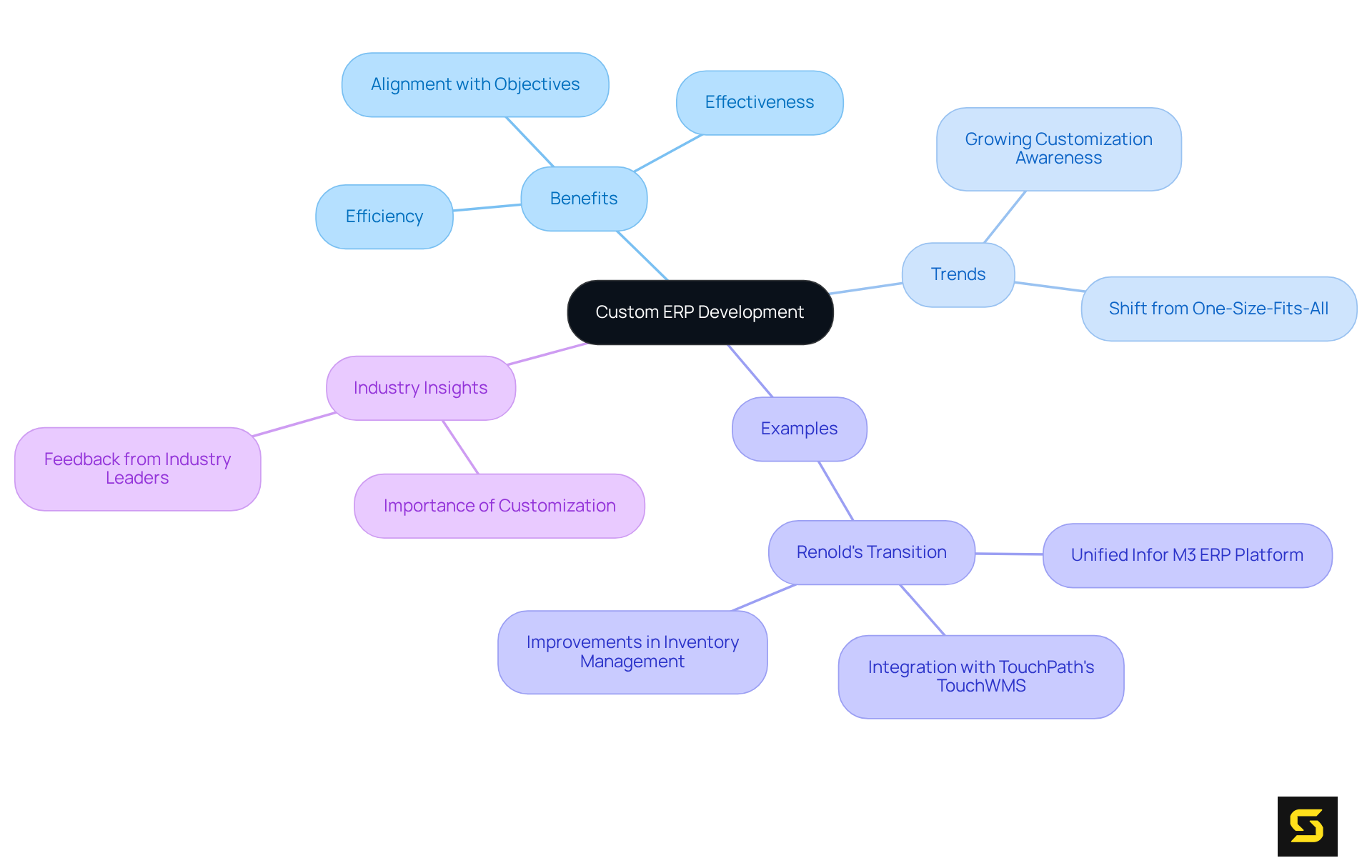
Prioritize Data Management for Effective ERP Implementation
Effective information management serves as the cornerstone of any ERP system. Organizations must establish robust governance policies that dictate the processes of information collection, storage, and access. This encompasses ensuring information accuracy, consistency, and security.
As Daniel Keys Moran aptly stated, "You can have facts without information, but you cannot have information without facts," underscoring the critical role of facts in informed decision-making. By prioritizing information management, businesses can significantly enhance the reliability of their custom ERP development, leading to improved insights and informed decision-making.
Furthermore, effective information governance not only streamlines operations but also fosters a culture of accountability and transparency—essential elements for maximizing the benefits of custom ERP development.
To successfully implement data governance policies, organizations should:
- Regularly review and update their data management practices
- Engage key stakeholders in the process
- Invest in comprehensive training to ensure all team members understand their roles in maintaining data integrity
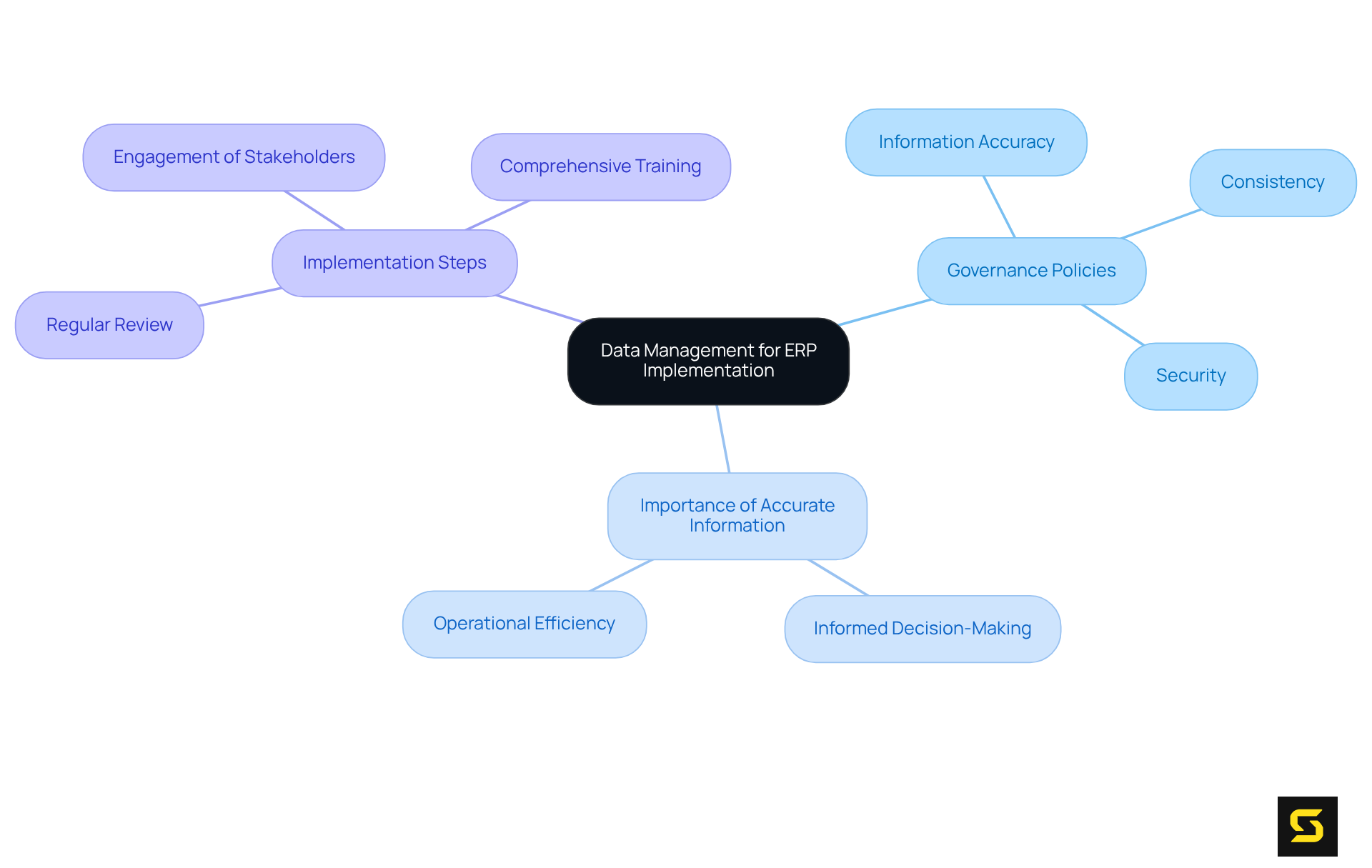
Map Business Processes to Enhance ERP Functionality
Charting current business procedures is not just beneficial; it is essential before deploying an ERP solution. This process involves:
- Meticulously documenting workflows
- Pinpointing bottlenecks
- Comprehensively understanding the interactions between different departments
By undertaking this critical analysis, organizations can enhance efficiency and streamline operations through custom ERP development tailored to their specific needs. Ultimately, this ensures that the ERP setup supports business processes rather than hinders them.
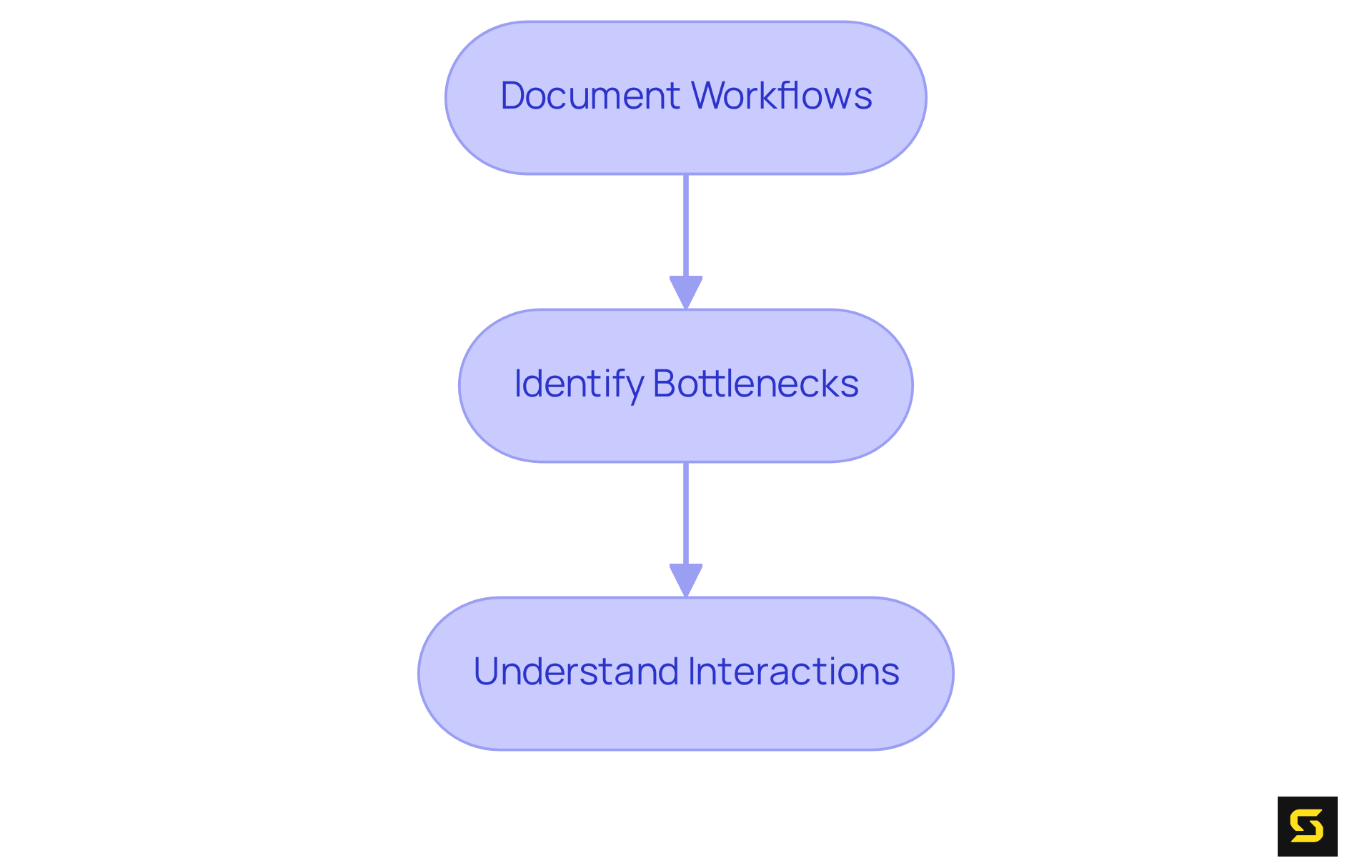
Ensure Scalability to Support Business Growth
In the development of an ERP system, prioritizing scalability is not merely important; it is crucial. A scalable solution is meticulously designed to evolve alongside the business, adeptly managing increased data volumes, user loads, and additional functionalities as required. This adaptability not only supports current operations but also , significantly mitigating the risk of disruptions during expansion.
Entities that have adopted scalable ERP solutions report heightened operational efficiency and improved inventory management, with an impressive 91% observing optimized inventory levels post-implementation. Furthermore, 83% of entities that conducted an ROI analysis prior to implementation achieved their ROI expectations, underscoring the tangible benefits of scalable solutions.
As the global digital transformation market is projected to soar to $1,009.8 billion by 2025, the demand for scalable ERP solutions will only intensify. Technology leaders assert that future-proofing ERP solutions is vital; over 65% of organizations regard artificial intelligence (AI) as essential to their ERP solutions, and 70% of CIOs prioritize predictive analytics and machine learning to maintain a competitive edge.
Therefore, selecting an ERP solution that can scale effectively transcends a technical decision; it is a strategic imperative for sustainable business growth.
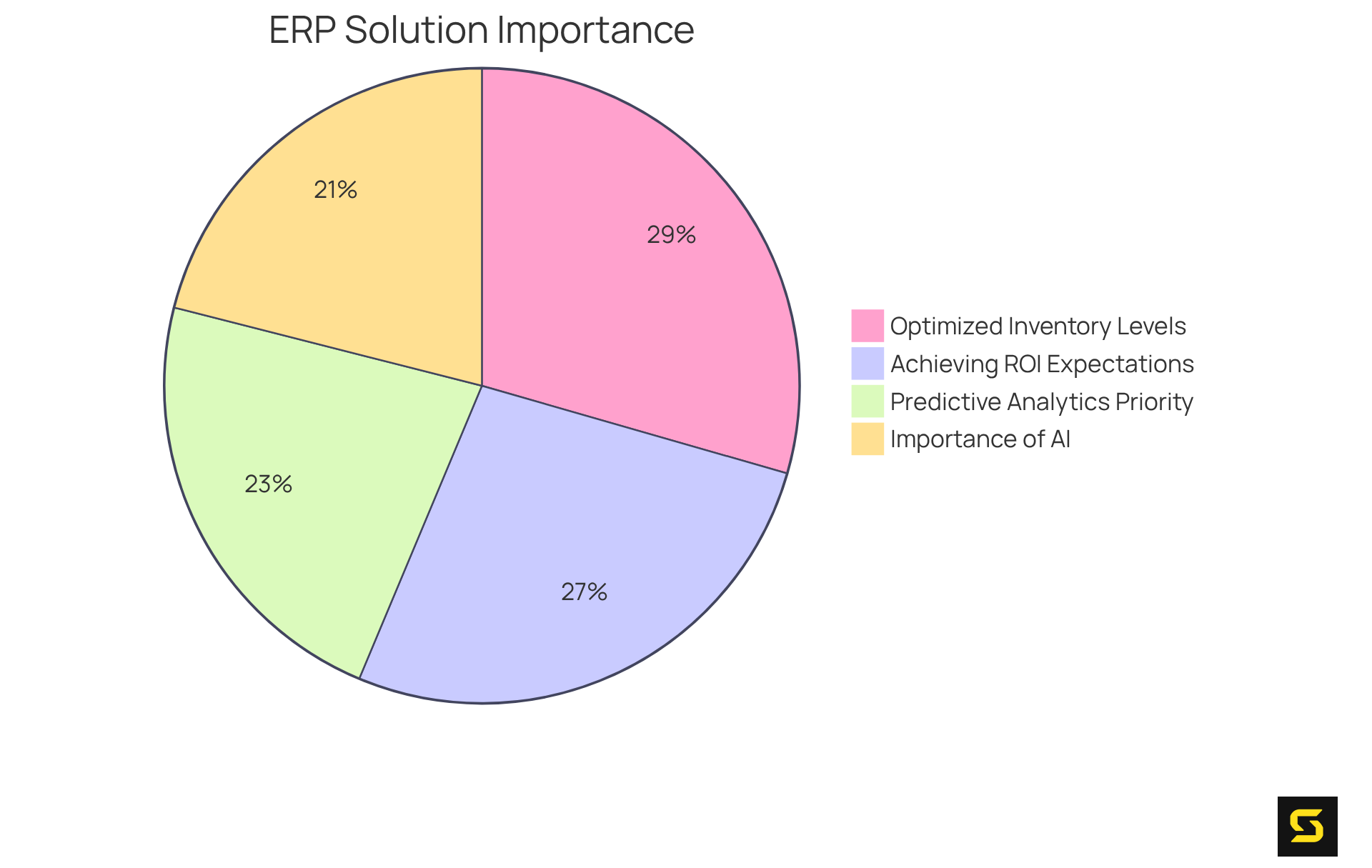
Invest in User Training to Drive ERP Adoption
Investing in thorough user training is not just beneficial; it is essential for driving ERP adoption and maximizing platform usage. Organizations must develop tailored training programs that cater to the specific needs of different user roles, ensuring that every individual is equipped to utilize the platform effectively. This strategic approach not only but also fosters a collaborative and efficient work environment.
Research indicates that effective training can lead to significant increases in user satisfaction and engagement. For instance, Nema Holding achieved a remarkable 27% improvement in overall financial consolidation efficiency through well-structured training initiatives. Proven training strategies, including hands-on workshops and continuous support, have demonstrated their ability to elevate user competence and confidence.
A training expert aptly states, 'Custom ERP development is crucial for creating tailored training programs that ensure users feel confident and competent in using ERP solutions.' Such strategies culminate in enhanced operational efficiency, as evidenced by Nema Holding's 25% reduction in processing time for financial consolidation tasks, facilitating a smoother transition to the new framework.
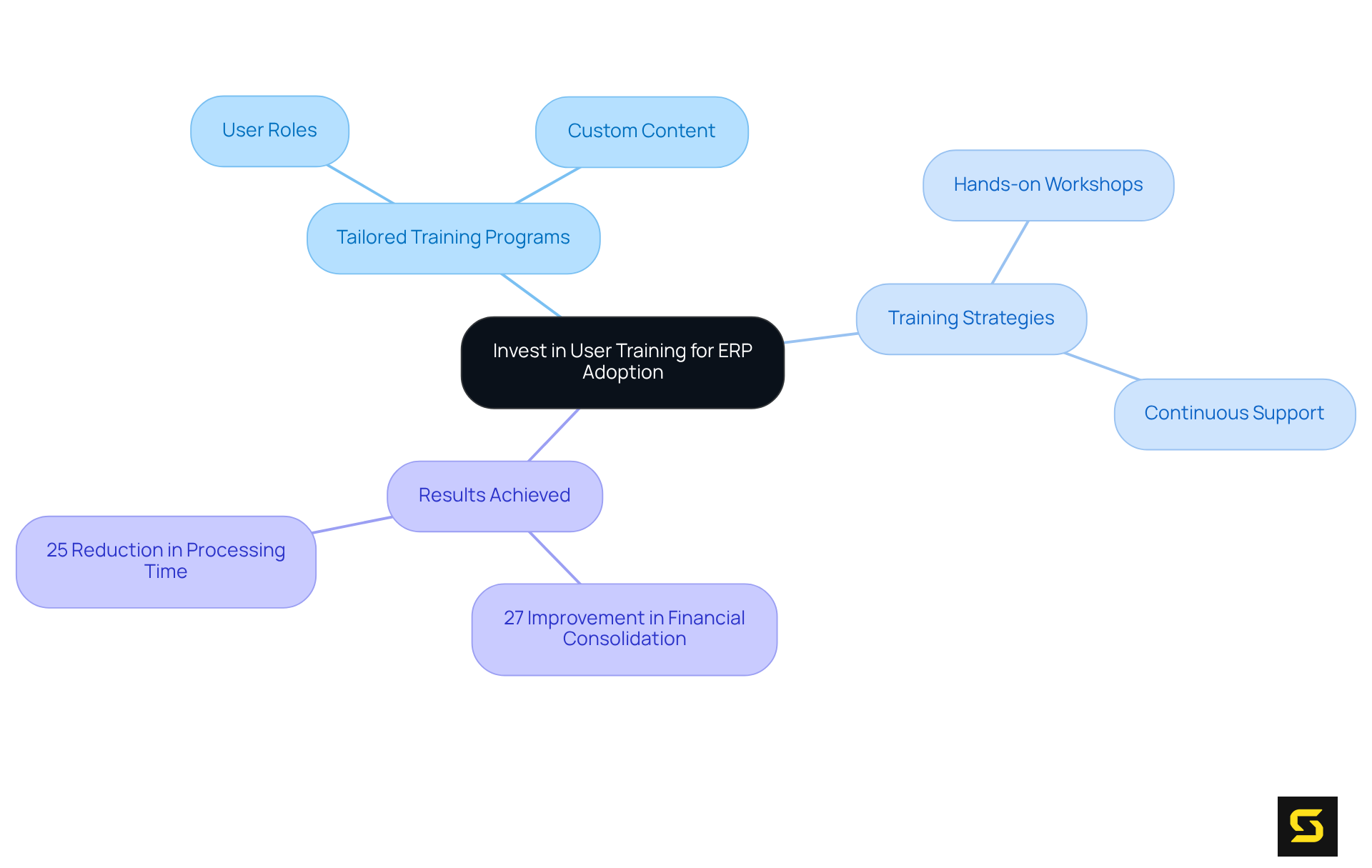
Embrace Continuous Improvement for Long-Term ERP Success
To ensure enduring success with custom ERP development, companies must embrace a culture of continuous enhancement. This involves:
- Regularly evaluating performance
- Gathering user feedback
- Implementing necessary adjustments to enhance functionality
Notably, studies indicate that:
- 66% of companies experienced improved operational efficiency as a result of their ERP solutions
- 91% observed optimized inventory levels post-implementation
- 77% of organizations eliminated data silos, fostering enhanced inter-departmental collaboration
By nurturing an environment of perpetual growth, companies can ensure that their custom ERP development evolves in alignment with their operational needs. However, it is essential to recognize that 50% of ERP implementations falter on their initial attempt, highlighting the necessity for a proactive strategy.
As Kim Stevenson, CIO, asserts, "We’re only at the very, very beginning of this next generation of computing, and I think that every industry will be the ones that transform first." This underscores the imperative for organizations to their custom ERP development solutions.
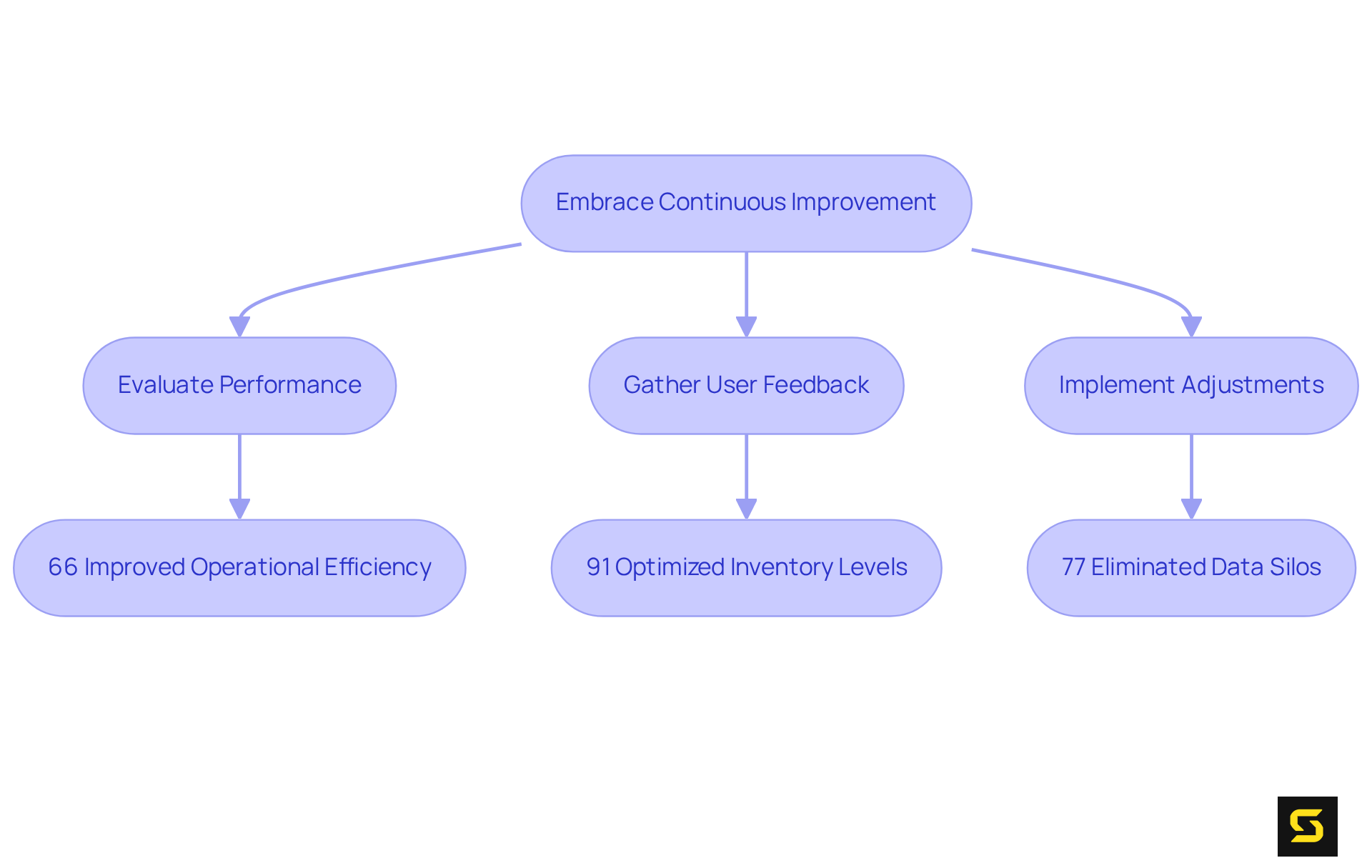
Select and Evaluate Vendors for Optimal ERP Solutions
Selecting the right vendor for custom ERP development is a critical step in the development process. Organizations must evaluate potential vendors based on their experience, customer support, and the scalability of their offerings. A comprehensive evaluation should include the following key considerations:
- Experience and Expertise: Vendors with a proven track record in ERP implementations offer invaluable insights into best practices and potential pitfalls. Their familiarity with industry-specific challenges significantly enhances the effectiveness of the solution.
- Customer Support: Robust vendor support is essential for smooth implementation and ongoing maintenance. Statistics indicate that vendor support and features are pivotal factors in the ERP evaluation process. Organizations should prioritize vendors known for responsive customer service and training resources, as these factors are critical for user adoption and long-term success.
- Scalability: As businesses expand, their ERP solutions must adapt accordingly. Vendors that provide , such as pay-as-you-grow models, empower organizations to enhance their capabilities without incurring excessive costs.
- Integration with Current Frameworks: High priority must be given to vendors that demonstrate the ability to integrate seamlessly with existing frameworks, ensuring a smoother transition and enhanced operational efficiency.
- References and Reviews: Conducting thorough research and seeking independent references yield valuable insights into a vendor's reliability and performance. Engaging with current and past clients reveals how well the vendor meets expectations and supports their systems post-implementation.
- Collaborative Decision-Making: Involving key stakeholders in the evaluation process ensures that diverse perspectives are considered, leading to a more informed selection that aligns with the entity's strategic objectives.
By focusing on these criteria, organizations can make informed decisions that not only meet their immediate needs but also support long-term operational excellence with custom ERP development. A well-structured vendor evaluation process is essential for aligning business goals with custom ERP development capabilities, ultimately fostering enhanced decision-making and resilience in a rapidly changing market.
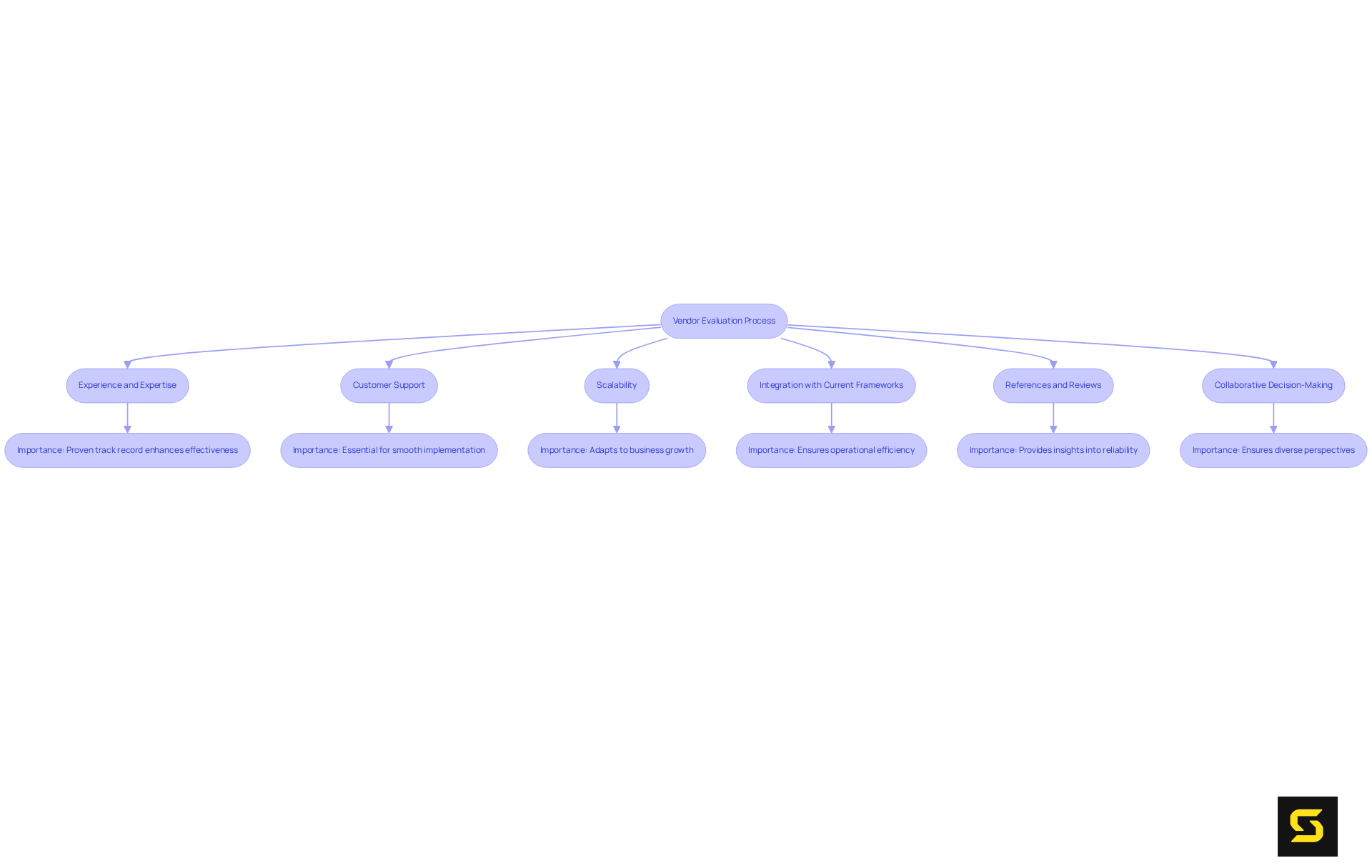
Implement Change Management Strategies for Smooth Transitions
Implementing effective change management strategies is crucial for a seamless transition to a new custom ERP development solution. This entails clearly to all stakeholders, addressing their concerns, and offering ongoing support throughout the process. By promoting open channels of communication, entities can significantly lessen resistance to change.
Studies indicate that companies investing less than 13% on training are three times more likely to encounter issues during implementation. Furthermore, effective change management not only improves user adoption but also aligns the goals of the enterprise with the functionalities of custom ERP development. Involving stakeholders frequently and from the start fosters a sense of ownership and dedication, ultimately resulting in a more favorable outlook towards the new framework.
As noted by change management experts, the cost of stagnation often outweighs the cost of change, making it imperative for organizations to embrace transformation proactively. Bill Clinton aptly stated, "The price of doing the same old thing is far higher than the price of change," emphasizing the necessity of investing in change management. Additionally, engaging users in the ERP implementation process is essential, as it fosters engagement and reduces resistance—a critical aspect highlighted by experts in the field.
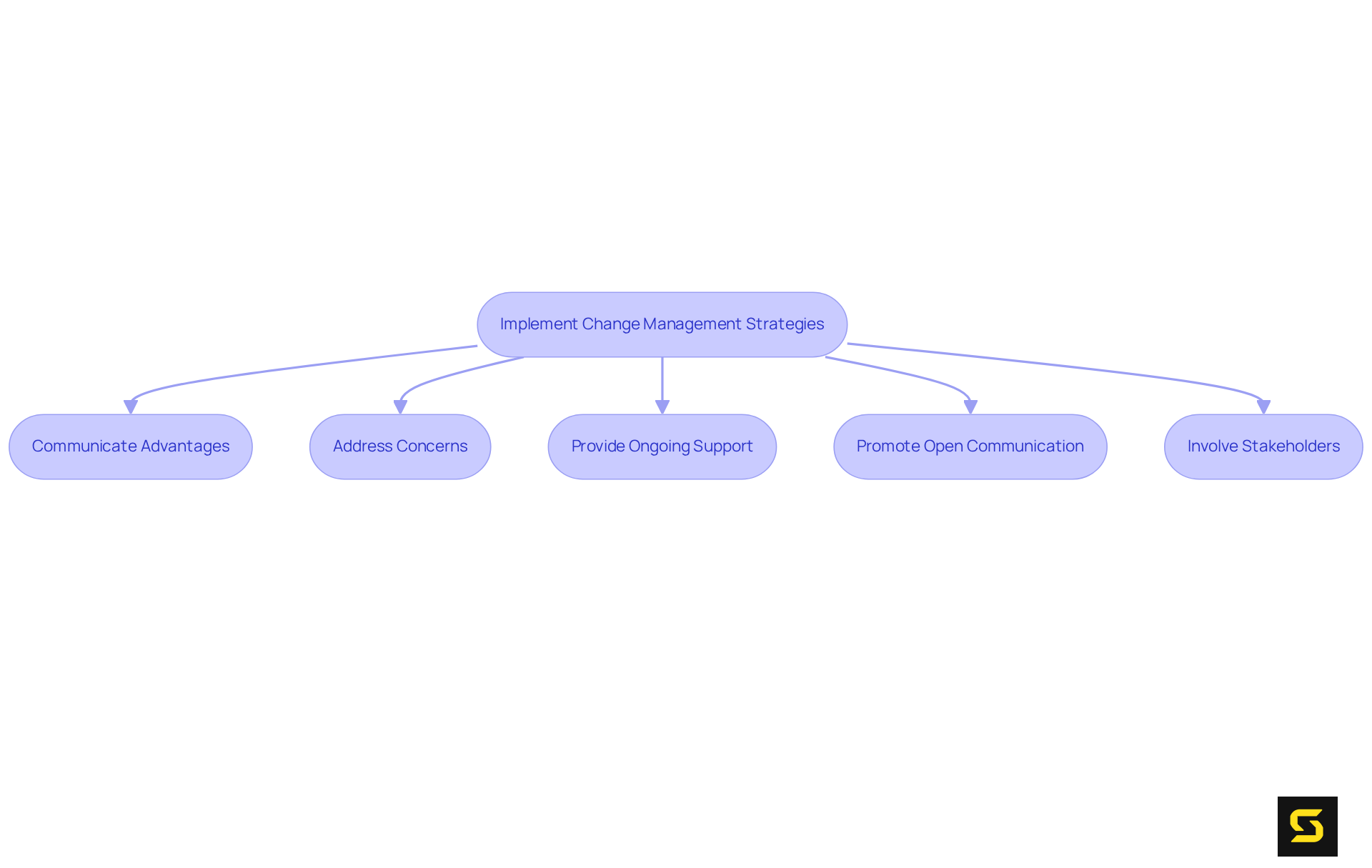
Address Technical Considerations for Robust ERP Development
Addressing technical considerations is paramount for custom ERP development to ensure a robust system. Ensuring the security of the framework, the integrity of information, and compatibility with current technologies is essential. Organizations must collaborate closely with technical teams to identify potential challenges and implement effective solutions. This proactive approach not only enhances the overall performance of the ERP system but also significantly boosts its reliability. By prioritizing these technical aspects, organizations position themselves for success in their custom ERP development initiatives.
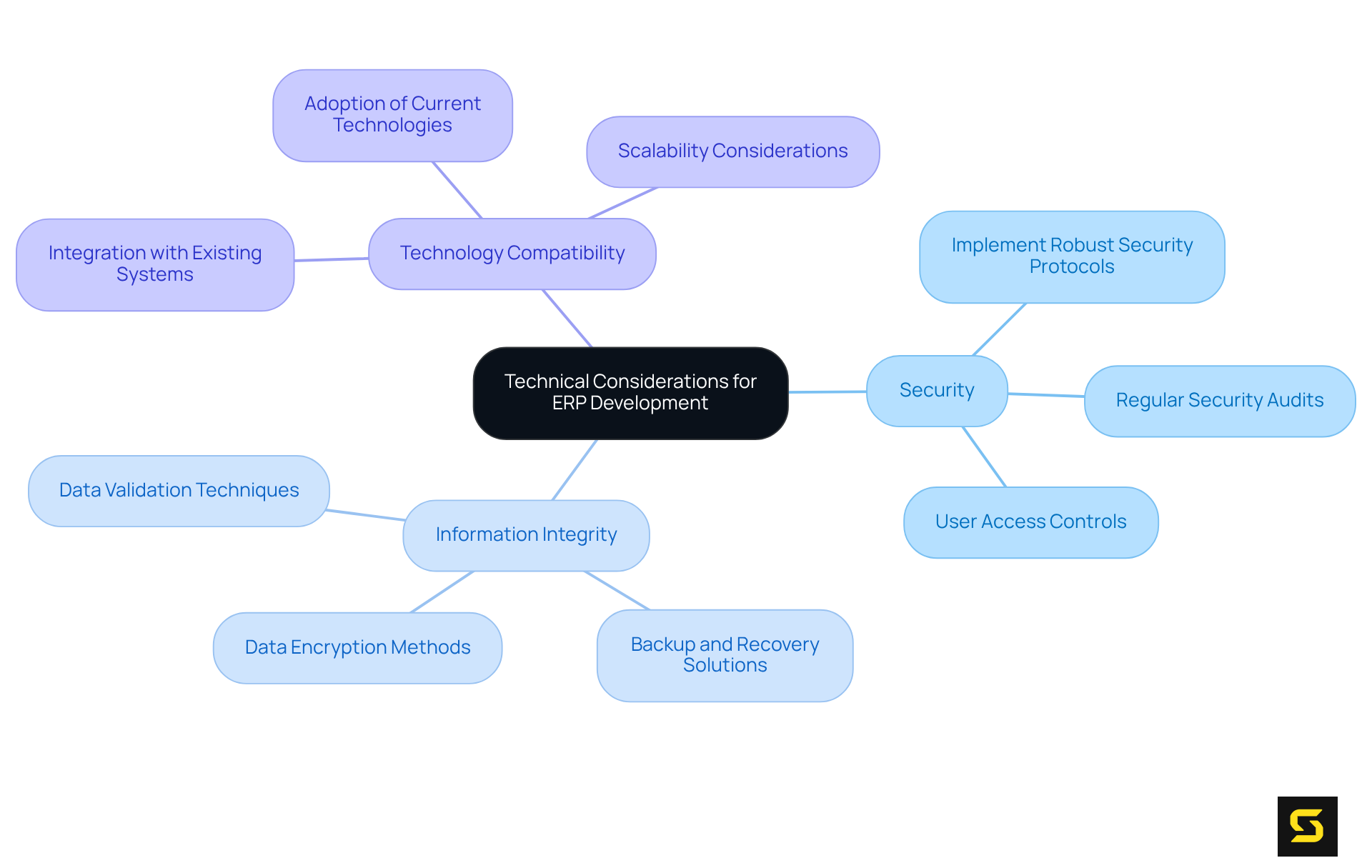
Summarize Key Takeaways for Successful ERP Development
In summary, successful custom ERP development relies on several key factors:
- Tailoring solutions to meet specific business needs
- Prioritizing data management
- Mapping business processes
- Ensuring scalability
- Investing in user training
- Embracing continuous improvement
- Selecting the right vendors
- Implementing change management strategies
- Addressing technical considerations
Notably, the case study of Ronin Gallery illustrates how custom ERP development led to doubled employee productivity and significantly improved operational efficiency. Furthermore, numerous advisers advocate assessing approximately five vendors prior to making a choice to guarantee the best match for your entity. Quotes from industry leaders, such as David Libertson's appreciation for tailored implementation, further validate these practices.
It is crucial to be aware of potential pitfalls, as evidenced by a multinational distributor that encountered failure due to pre-existing operational issues. By focusing on these areas and considering these insights, organizations can enhance their ERP systems and drive long-term success.
As a practical step, when evaluating ERP vendors, consider creating a checklist of your specific business requirements to guide your selection process.
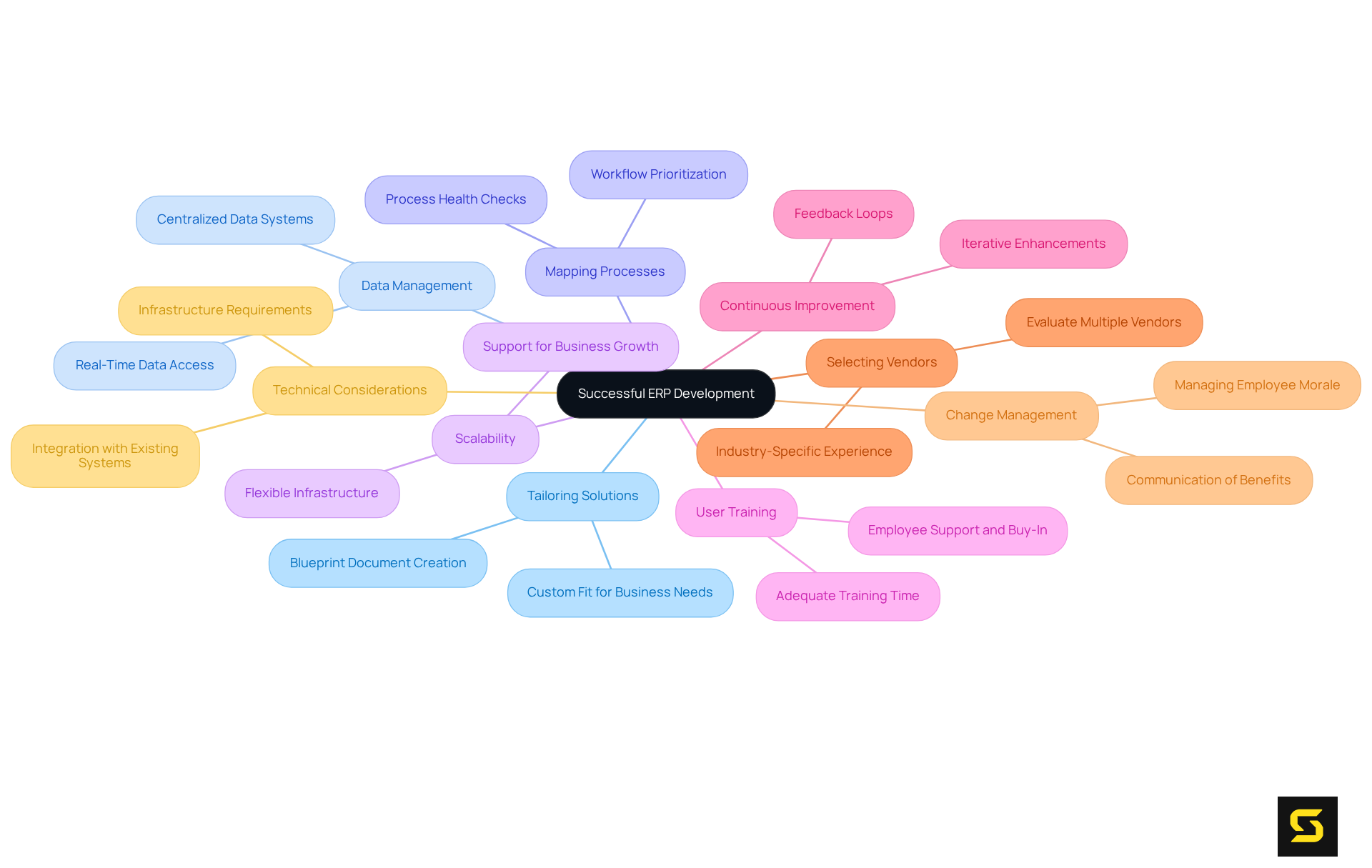
Conclusion
Successful custom ERP development is built on a strategic approach that emphasizes tailored solutions, effective data management, and continuous improvement. By prioritizing the unique needs of an organization, companies can implement ERP systems that seamlessly align with their workflows, thereby enhancing operational efficiency and driving business success.
Key insights throughout this discussion underscore the significance of various factors, including:
- Mapping business processes
- Ensuring scalability
- Investing in user training
The case study of Renold exemplifies the transformative power of custom ERP solutions. Moreover, the focus on selecting the right vendors and implementing change management strategies illustrates the multifaceted nature of ERP development. Each of these elements is crucial in creating a robust system that supports long-term growth.
Ultimately, organizations must adopt a proactive mindset towards ERP development. By embracing change, fostering a culture of continuous improvement, and diligently evaluating vendor options, businesses can navigate the complexities of ERP implementation with confidence. This strategic focus not only mitigates risks but also positions companies for sustained success in a dynamic business landscape.
Frequently Asked Questions
What is SDA known for in the context of ERP development?
SDA is recognized as a leader in custom ERP development, creating software solutions that are meticulously tailored to meet the unique needs of businesses, enhancing overall efficiency and effectiveness.
Why is customization important in ERP development?
Customization is crucial because it allows ERP solutions to align with specific workflows and operational requirements of organizations, enabling them to fully harness their frameworks and achieve strategic objectives.
Can you provide an example of successful custom ERP implementation?
Yes, Renold's transition to a unified Infor M3 ERP platform, integrated with TouchPath's TouchWMS, is a prime example. This implementation resulted in significant improvements in inventory management and operational accuracy.
What is the significance of effective information management in ERP systems?
Effective information management is essential as it establishes robust governance policies for information collection, storage, and access, ensuring accuracy, consistency, and security, which are critical for informed decision-making.
What steps should organizations take to implement data governance policies successfully?
Organizations should regularly review and update their data management practices, engage key stakeholders in the process, and invest in comprehensive training to ensure all team members understand their roles in maintaining data integrity.
Why is mapping business processes important before deploying an ERP solution?
Mapping business processes is essential as it involves documenting workflows, identifying bottlenecks, and understanding departmental interactions, which helps enhance efficiency and ensures the ERP setup supports business processes effectively.





